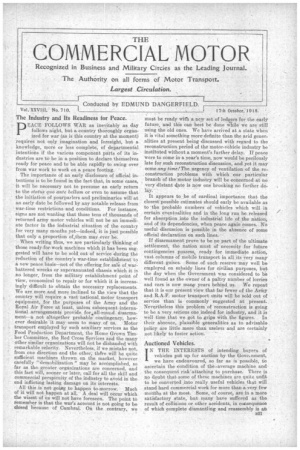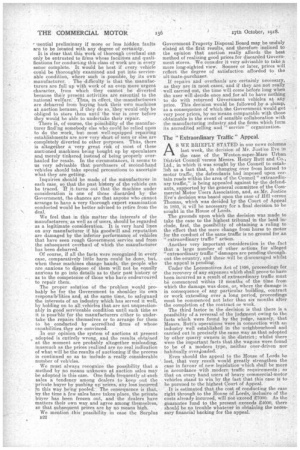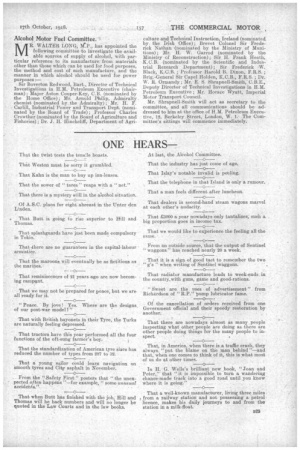The Industry and Its Readiness for Peace.
Page 1

Page 2

Page 3

If you've noticed an error in this article please click here to report it so we can fix it.
pEACE FOLLOWS WAR as inevitably as day follows night, but a country thoroughly organized for war (as is this country at the moment) requires not only imagination and foresight, but a knowledge, more or less complete, of departmental intentions if the various component parts of its industries are to be in a position to declare themselves ready for peace and to be able rapidly to swing over from war work to work on a peace footing.
The importance of an early disclosure of official intentions is to be found in the fact that, in some cases, it will be necessary not to presume an early return to the status quo ante bellum or even to assume that the initiation of pourparlers and preliminaries will at an early date be followed by any notable release from war-time restrictions and conditions. For instance, signs are not wanting that those tens of thousands of returned army motor vehicles will not be an immediate factor in the industrial situation of the country for very many months yet—indeed, it is just possible that only a proportion of„them may ever be.
When writing thus, we are particularly thinking of those ready-for-work machines which it has been suggested will have to be sold out of service during the reduction of the country's war-time establishment to a new peace basis—not of the offering for sale of warbattered wrecks or superannuated chassis which it is no longer, from the military establishment point of view, economical to repair or for which it is increasingly difficult to obtain the necessary replacements. We are more and more inclined to the view that the country will require a vast nationaLmotor transport equipment, for the purposes of the Army and the Royal Air Force at least, unless subsequent international arrangements provide for.all-round:disarmament—a not altogether probable contingency, however desirable 'it may seem to many of us. Motor transport employed by such auxiliary services as the Food Production Department, the Home Grown Timber Committee, the Red Cross Services and the many other similar organizations will not be disbanded with remarkable celerity. Nevertheless, if we mistake not, from one direction and the other, thare will be quite sufficient machines thrown on the market, however carefully "demobilization" may be accomplished, so far as the greater organizations are concerned, and this fact will, sooner or later, call for all the skill and commercial perspicuity of the industry to avoid in the end inflicting lasting damage on its interests.
All this is not goiorg to happen to-morrow. Much of it will not happen at all. &deal Will °Celli which the wisest of Us will not have foreseen. The point to remember is that the war's account is not going to be closed because of Cambrai. On the contrary, we must be ready with'a new set of ledgers for the early future, and this can best be done while we are still using the old ones. We have arrived at a state when it is vital something more definite than the arid generalities at present being discussed with regard to the reconstruction period of the motor-vehicle industry be instituted without a moment's further delay. It peace were to come in a year's time, now would be perilously late for such reconstruction discussion, and yet it may come any time! The urgency of ventilation of the reconstruction problems with which our particular branch of the motor industry will be concerned at no very distant date is now one brooking no further delay. '
It appears to be of cardinal importance that the closest'possible estimateri should early be available as to ' the probable numbers of vehicles which will in certain eventualities and in the long run be released for absorption into the industrial life of the nation, and of its dependencies, when peace again comes. No useful discussion is possible in the absence of some official declaration on such lines.
If disarmament prove to be no part of the ultimate settlement, the nation must of necessity for future contingencies possess,, ready for immediate action, vast columns of mobile transport in all its very many different guises. Some of such reserve may well be employed on subsidy lines for civilian purposes, but the day when the Government was considered to be well found as the owner of a paltry number of lorries and cars is now man,y years behind us. We repeat that it is our present view that far fewer of the Artily and R.A.F. motor transport units will be sold out of service than is commonly suggested at present. Nevertheless this problem of reconstruction is going to be a very serious one indeed for industry, and it is well time that we got to grips With the figures. In their absence, plausible generalities as to advisable policy are little more than useless and are certainly not likely to foster action.
Auctioned Vehicles.
N THE INTERESTS of intending buyers of vehicles put up for auction by the Gove,nment, we have endeavoured, so far as is possible, to ascertain the condition of the.average machine and the consequent risleattaching to purchase. There is no doubt that some of these machines are quite unfit to be converted ,into really useful vehicles that will stand hard commercial work for more than a very few months at the most. Some, of course, are in a more satisfactory state, but many have suffered as the result of collisions or other accidents, in consequence of which !complete dismantling and reassembly is an B21 •
=.sential preliminary if more or less hidden faults are to be located with any degree of certainty. It is clear that this work of thorough overhaul can only be entrusted to firms whose facilities and qualifications for conducting this class of work are in every sense complete. It would be best if every vehicle could be thoroughly examined and put into serviceable condition, where such is possible, by its own manufacturer. The 'difficulty is that the manufacturers are full up with work of an even more urgent character, from which they cannot be diverted because their present activities ate essential to the national welfare. Thus, in effect, the manufacturers are debarred from buying back their own machines at auction because, if they do so:they would only be obliged to store them until the War is over before they would be elate to undertake their repair. There is, of course, the possibility of the manufacturer fincEng somebody else who could be relied upon to do the work, but most well-equipped repairing establishments are now very short of men or else are completely diverted to other purposes. Thus, there is altogether a very great risk of most of these auctioned machines being bought up by speculators and merely tinkered instead of being properly overhauled for resale. In the circumstances, it seems to us very advisable that purchasers of second-hand vehicles should take special precautions to ascertain what they are getting.
Inquiries should be made of the manufacturer in each case, so that the past history of the vehicle can be traced. If it turns out that the machine under consideration is one of those discarded by the Government, the chances are that anyone who cannot arrange to havo a very thorough expert examination conducted would be better advised to retire from the deal.
We feel that in this matter the interests of the manufacturers, as well as of users, should be regarded as a legitimate consideration. It is very hard lines on any manufacturer if his goodwill and reputation are damaged by the inferior performance of vehicles that have seen rough Government service and from the subsequent overhaul of which the manufacturer has been debarred.
Of course, if all the facts were recognized in every case, comparatively little harm could be done, but, when these machines change hands, the people who are anxious to dispose of them will not be equally anxious to go into details as to their past history or as to the competence of those who have endeavoured to repair them.
The proper solution of the problem would probably be for the Government to shoulder its own responsibilities and, at the same time, to safeguard the interests of an industry which has served it well, by holding on to all vehicles that are not unquestionably in good serviceable condition until such time as it is possible for the manufacturers either to undertake the repairs themselves or to arrange for them to be conducted by accredited firms of whose capabilities, they are convinced. In our opinion, the system Of auctions at present adopted is entirely wrong, and the results obtained at the moment are probably altogether misleading, inasmuch as the prices realized are no real indication of what will be the results of auctioning if the process is continued so as to include a really considerable number of vehicles.
We must always recognize the possibility that a method by no means unknown at auction sales may be adopted in this case. One finds frequently at-such sales a tendency among dealers to keep out the private buyer by pushing up prices,-any loss incurred in this way being pooled. The consequence is that, by the time a few sales have taken place, the private buyer has been frozen out, and thedealers have matters their own way and agree among themselves, so that subsequent prices are by no means high.
We mention this possibility in case the Surplus B22 Government Property Disposal Board may be unduly elated at the first results, and therefore inclined to the opinion that auction really affords the best method of realizing good prices for discarded Government stores. We consider it very advisable to take a more long-sighted view. Sooner or later, prices will reflect the degree of satisfaction afforded to the ultanate. purchaser. If repairs and overhauls are certainly necessary, as they are in most cases, and if they are not really well carried out, the time will come before long when the user will decide once and for all to have nothing to do with returned Government vehicles at any price. This decision would be followed by a slump, as a consequence of which the Government would get very poor prices, by no means comparable with those obtainable in the event of sensible collaboration with the manufacturing industry and the firms which form , its accredited selling and ' service" organization.
The "Extraordinary Traffic" Appeal.
AS WE BRIEFLY STATED in our news columns last week, the decision of Mr. Just,ce Eve in the case of the Weston-super-Mare Urban Distriet Council versus Messrs. Henry Butt and Co., Ltd., in which it was sought by the Council to establish as a fact that, in changing over from horsed to motor traffic, the defendants had imposed upon certain roads within the area of the. Council" extraordinary traffic,", is being appealed against bythe defendants, supported by the general committee of the Commercial Motor Users Association, and, as.Mr. Justice Eve's decision was based upon the case of Hill versus Thomas,. which was decided by the Court of Appeal in 1893, it will be necessary for a final decision to be sought in the House of Lords.
The grounds upon which the decision was made to take the case to the highest tribunal in the land include, first, the possibility of obtaining a ruling to the effect that the mere change from horse to motor for the conduct of the same traffic is no ground for an "extraordinary traffic" action.
Another very important consideration is the fact that a large number of other actions for alleged " extraordinary traffic "damages are pending throughout the country, and these will be discouraged whilst the appeal is pending. Cinder the Locomotives Act of 1898, proceedings for the recovery of any expenses which shall prove to have been incurred as a result of extraordinary traffic must be commenced within 12 montha of the time from which the damage was done, or, where the damage is in consequence of any particular building, contract or work extending over a long period, proceedings must be commenced not later than six months after the completion of the contract or work. . The third factor in the decision is that there is a possibility of a reversal of the judgment owing to the facts which were found by the judge, namely, that Messrs. Butt's operations were in connection with an industry well established in the neighbourhood and carried out in precisely the same way as that adopted by other quarry owners in the district ; whilst there were the important facts that the wagons were found to be of a modern type, neither over-driven nor habitually overjoaded. .
Even should the appeal to the House of Lords be lost, that very result would greatly strengthen the case in favour of new legislation which shall be more in accordance with modern traffic requirements ; so that on every hand users of heavy commercial-motor vehicles stand to win by the fact that this case is to be pursued to the highest Court of Appeal.
It is estimated that the cost of conducting the case right through to the House of Lords, inclusive of the costs already incurred, will not 'exceed £7000. As the guarantee fund to the present exceeds 24000, there should be no trouble whatevet in obtaining the necessary financial backing for the appeal. Alcohol Motor Fuel Committee. -- MR. WALTER LONG, ITP., has appointed the following committee to investigate the available sources of supply of alcohol, with particular reference to its manufacture from materials other than those which can be used for food purposes, the method and cost of such manufacture, and the manner in which alcohol should be used for power purposes : Sir Boverton Redwood, Bart., Director of Technical Investigations in JIM. Petroleum Executive (chairman); Major Aston Cooper-Key, C.B. (nominated by the Home Office); Mr. Arnold Dhilip, Admiralty chemist (nominated by the Admiralty) ; Mr. H. F. Carlill, Industrial Power and Transport Dept. (nominated by the Board of Trade); Professor Charles Crowther (nominated by the Board of Agriculture and Fisheries); Dr. J. H;Ilincheliff, Department of Agri culture and Technical Instruction, Ireland (nominated by. the Irish Office); Brevet Colonel Sir Frederick Nathan (nominated by the Ministry of Munitions); Mr. H. W. Garrod (nominated by the Ministry of Reconstruction) ;• Sir H. Frank Heath, K.C.B. (nominated by the Scientific and Industrial Research Department); Sir Frederick W. Black, K.C.B.; Professor Harold B. Dixon, F.R.S. ; Brig.-General Sir Cape! Holden, K.C.B., F.R.S. ; Dr. W. R. Ormandy ; Mr. K S. Shrapnell-Smith; C.B.E., Deputy Director of Technical Investigations in H.M. Petroleum Executive ; Mr. Horace Wyatt, Imperial Motor Transport Council.
Mr. Shrapnel!-Smith will act as secretary to the committee, and all communications should be addressed to him at the office of ELM, Petroleum Executive, 12, Berkeley Street, London, W. 1. .The Committee's sittings will commence immediately.






















